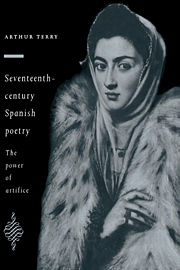Book contents
- Frontmatter
- Contents
- Preface
- List of abbreviations
- 1 The inheritance
- 2 Theory and practice
- 3 Luis de Góngora: the poetry of transformation
- 4 Lope de Vega: re-writing a life
- 5 Between two centuries: from Medrano to Valdivielso
- 6 Francisco de Quevedo: the force of eloquence
- 7 The literary epic
- 8 Plenitude and decline: from Villamediana to the second half of the century
- 9 Sor Juana Inés de la Cruz: the end of a tradition
- Epilogue
- Notes
- Select bibliography
- Index
2 - Theory and practice
Published online by Cambridge University Press: 01 October 2009
- Frontmatter
- Contents
- Preface
- List of abbreviations
- 1 The inheritance
- 2 Theory and practice
- 3 Luis de Góngora: the poetry of transformation
- 4 Lope de Vega: re-writing a life
- 5 Between two centuries: from Medrano to Valdivielso
- 6 Francisco de Quevedo: the force of eloquence
- 7 The literary epic
- 8 Plenitude and decline: from Villamediana to the second half of the century
- 9 Sor Juana Inés de la Cruz: the end of a tradition
- Epilogue
- Notes
- Select bibliography
- Index
Summary
Rules, as C. H. Sisson has observed, ‘always deceive the pedantic, because they get taken for wilful instructions when they are in fact the laws of the material’. The material of Renaissance poetry is of course language, or rather language filtered through a mass of preconceptions which differ considerably from those of a modern reader and which often seem remote from poetry itself. This is easier to understand once one realizes that all Renaissance theory and practice rests on a philosophical basis – more precisely, on a view of reality and of the nature of the universe – which has more in common with medieval views on man's place in the Divine Order than with the theories of a Descartes or a Newton. The key term here is analogy: broadly speaking, the Renaissance still retains the idea of a hierarchical cosmos in which the universal and the particular are inextricably bound together by a complex network of analogies or ‘correspondences’. This operates at all levels: earthly things are in some sense a reflection of heavenly things; the body politic can be compared in detail to the workings of the human body; or to use a favourite concept of neo-Platonism, the relation between earth and heaven is that of a ‘microcosm’ to a ‘macrocosm’ – a ‘little world’ dependent on a greater – and all things on earth can be seen as imperfect copies of eternal archetypes. There is something very impressive, not to say awe-inspiring, about this vision of a harmonious universe in which everything – men, creatures and natural phenomena – is bound together in natural sympathy.
- Type
- Chapter
- Information
- Seventeenth-Century Spanish Poetry , pp. 35 - 64Publisher: Cambridge University PressPrint publication year: 1993



